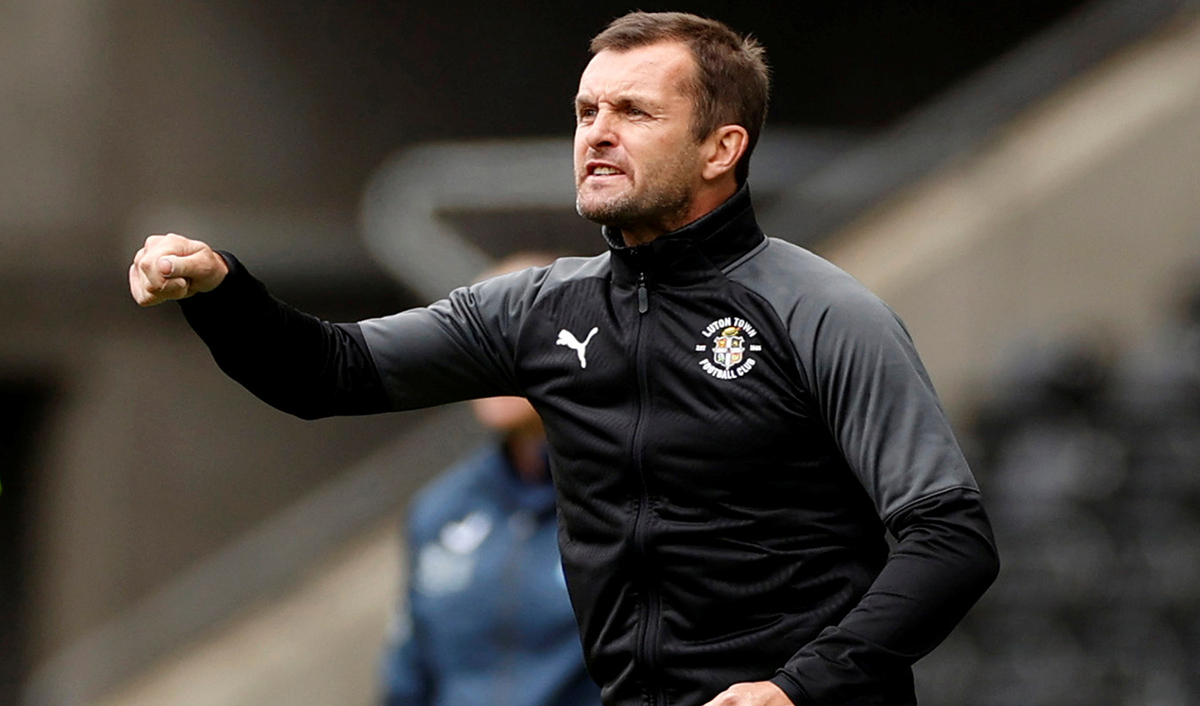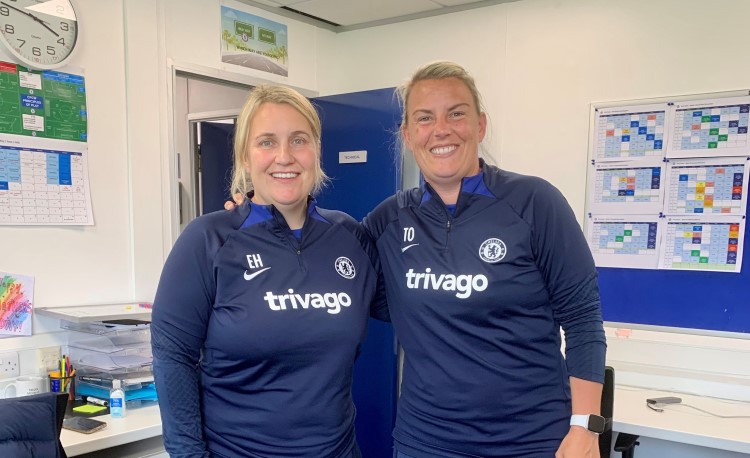NEXT ELITE SOCCER COACHING AWARD COHORT STARTS FEBRUARY 16 - ENROL NOW
You are viewing 1 of your 1 free articles
Taking his time
Luton Town’s Nathan Jones talks through some of the valuable lessons that have served him well in his career in management
In his first spell at Luton Town, Nathan Jones took the side from the bottom half of League Two to the brink of the Championship in only three years. Now back, after a brief spell at Stoke, he’s determined to keep learning and developing.
When Nathan Jones got his first opportunity to coach he imagined he would fly, but the reality of the job brought him back down to earth with a bump. It was 2009 and, armed with his coaching badges, Jones was thrown in at the deep end as player-assistant manager of Yeovil Town, a team he had been part of for the previous seven years. What he lacked in coaching experience he made up for in drive, ambition, and a wealth of knowledge and inspiration gleaned from
his coaches, managers and mentors over the years.
The period Jones spent playing for Spanish sides Badajoz and Numencia in the mid-90s were particularly influential to his approach later as a manager. It also left him fluent in Spanish, which he believes has been a huge asset throughout his career.
“When I arrived in Spain, I found myself for the first time working within a highly organised set up, with everything focused on what was needed for the next fixture,” he says. “I was full of energy, but they encouraged me to slow down and take my time. That was the lifestyle, how they played football. It was an important lesson early on that you have to adapt to your environment.”
TIME TO GROW
While Jones learned fast on the job at Yeovil, he knew that to develop further as a coach he’d need to experience a variety of roles and challenges, at different levels of the game. In June 2012, therefore, he joined Championship club Charlton Athletic as U21 professional development coach under manager Chris Powell and academy director Paul Hart, who became Jones’s mentor.
When the opportunity arose to become a League One manager a year later, Jones declined, feeling he wasn’t yet ready. “I was ambitious, but also in no hurry,” he says. “It’s important not to try to run before you can walk, to give yourself time to develop and I knew what I was good at and what I needed to work on.”
The opportunity to hone his skills came at Brighton & Hove Albion, then in the Championship, where Jones spent three years as assistant manager to Óscar García, Sami Hyypiä and Chris Hughton. He also acted as caretaker manager for a short spell. The learning curve was steep, as Jones worked closely alongside each manager, as well as having the support of chief executive Paul Barber. “He helped me to gain valuable experience in dealing with the media, in presenting my ideas and career portfolio, and even in practising my interview skills,” he recalls.
“When you have that kind of experience around you, you have to tap into it,” says Jones, who has also gained a huge amount from mentor Paul Hart, now his assistant manager at Luton Town. “Even if Paul wasn’t here with me, I know I’d still have a close relationship with him, and he’d be someone I’d go to for advice and support. When I speak with experienced coaches and managers such as him, for example at LMA events, I always learn so much.”
A CLEAR VISION
When, in January 2016, Jones was appointed manager of League Two side Luton Town, his immediate challenge was to avoid relegation, which he did, but he also had a very clear idea of what he wanted to do with the side in the longer-term and how he wanted
to do it.
This included a strong emphasis on recruitment and player development, which he put into effect ahead of the following season with wholesale changes to the squad. “When I interviewed for the job I gave an extensive presentation to the club and they really bought into it,” he says. “Right from the start we had a clear, ambitious goal – to be a Championship side within four years – and a plan for how we’d achieve it. We wanted to make small steps forward in everything, from our game plan and fitness to our discipline.”
With ambition, hard work and focus on that goal, it was achieved in not four years but three. During that time, Jones was awarded LMA League Two Manager of the Month three times and when he left Luton he had the highest points per game ratio of any manager in the club’s history.
SELF-REFLECTION
In January 2019, Jones left Luton take the helm at Stoke City, then mid-table in the Championship. With expectations high and the challenges of competing in the second tier, Jones found it an unforgiving environment.
“In my first six months at Luton we hit the ground running with some decent results and that helped to get everyone on side,” he says. “Sadly, that wasn’t the case at Stoke; I didn’t get the results I needed to buy myself more time.”
While it was to be only a nine-month tenure, Jones believes it was a valuable experience and one he has reflected on, long and hard, even keeping a journal after his departure.
“I found it a really helpful tool for self-reflection after leaving Stoke,” he says. “I was totally honest in the journal; there was no bitterness, no finger pointing. It was just my thoughts on what I could have done better to deal with the challenges I faced and, perhaps more importantly, what I did well, because there were also a lot of positives to come out of my time at Stoke.”
He decided to keep the journal going when, in May 2020, he returned to Luton, who he had left only 18 months previously and who were now struggling to remain in the Championship. “Leaving and then coming back to the club in this way was far from ideal,” he says, “but I’m confident that the experience I had at Stoke left me a stronger manager and more ready for the challenge of guiding Luton out of their precarious position. It has been a really tough period, and with the pandemic also having an impact the financial implications of relegation would have been grave.”
WORK IN PROGRESS
Looking back, Jones can see just how much he has learned over the past five years, tactically and technically, but also in terms of the softer management skills. “I had, for example, thought
that man-management was a strong point of mine,” he says, “but at Stoke I found this was challenged massively because of the variety of characters and attitudes I encountered. I’ve learned that the group is the most important thing and you can’t have any one individual upsetting the apple cart. That’s why at Luton we look to recruit not just good players or good athletes, but good human beings who are ambitious, talented and hungry to learn.”
Perhaps most importantly, though, Jones has learned just how valuable it is to have experienced people around him, people he can trust to challenge him and help him to grow and develop. “I’m learning all
the time,” he says, “and I never want that to stop.”
Editor's Picks
Attacking transitions
Deep runs in the final third
Using the goalkeeper in build-up play
Intensive boxes drill with goals
Penetrating the final third
Creating and finishing
My philosophy
Pressing initiation
Compact team movement
Coaches' Testimonials

Alan Pardew

Arsène Wenger

Brendan Rodgers

Carlos Carvalhal

José Mourinho

Jürgen Klopp

Pep Guardiola

Roy Hodgson

Sir Alex Ferguson

Steven Gerrard
Related
Coaches' Testimonials

Gerald Kearney, Downtown Las Vegas Soccer Club

Paul Butler, Florida, USA

Rick Shields, Springboro, USA

Tony Green, Pierrefonds Titans, Quebec, Canada
Join the world's leading coaches and managers and discover for yourself one of the best kept secrets in coaching. No other training tool on the planet is written or read by the calibre of names you’ll find in Elite Soccer.
In a recent survey 92% of subscribers said Elite Soccer makes them more confident, 89% said it makes them a more effective coach and 91% said it makes them more inspired.
Get Monthly Inspiration
All the latest techniques and approaches
Since 2010 Elite Soccer has given subscribers exclusive insight into the training ground practices of the world’s best coaches. Published in partnership with the League Managers Association we have unparalleled access to the leading lights in the English leagues, as well as a host of international managers.
Elite Soccer exclusively features sessions written by the coaches themselves. There are no observed sessions and no sessions “in the style of”, just first-hand advice delivered direct to you from the coach.






